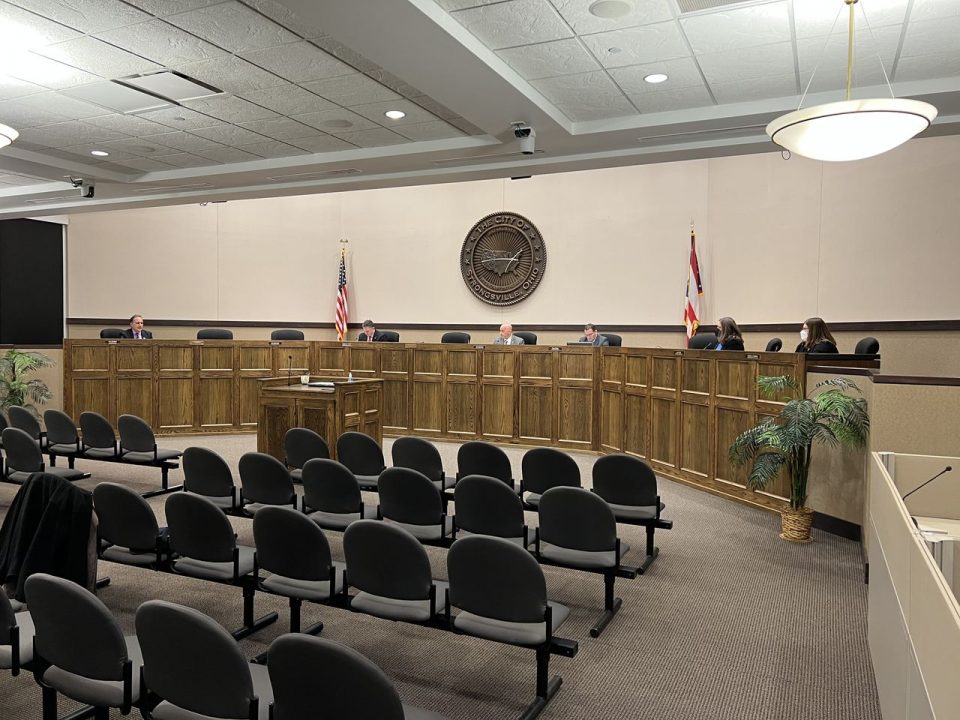STRONGSVILLE, Ohio — City Council is debating whether to regulate or ban giant shipping containers and railway cars in residential districts. Their use is becoming increasingly popular outside people’s homes.
People typically use the containers as dens — “man caves” or “she-sheds” — and as work sheds, Law Director Neal Jamison said.
A proposed ordinance would ban the containers as permanent structures outside homes, but some council members are pushing back.
“I’m not sure we have it (the ordinance) right, and I don’t see the urgency if we go back to the drawing board with it,” Councilwoman Ann Roff said at the Oct. 3 council meeting.
The issue of shipping containers in residential districts has come up in other parts of the country. In June, the Baker City Herald in Oregon reported that a 40-foot-long shipping container in the front yard of a home generated controversy. The container was 8 feet wide and 9 feet high.
Neighbors in Baker City complained about the shipping container, saying that it was an eyesore, lowered surrounding property values and violated city code.
Meanwhile, people are building entire homes out of shipping containers, a phenomenon reported in a 2017 New York Times article. Shipping-container homes are more affordable than conventional homes and are considered good for the environment.
In Strongsville, city officials said they knew of only two or three residents with shipping containers outside their homes. They said no one has complained about them.
Jamison said it was the Board of Zoning Appeals that first raised concerns about shipping containers in residential districts. The city administration drafted an ordinance that would ban them and introduced the ordinance to council in May.
Council referred the ordinance to the Planning Commission, which in May recommended approving it without discussion, according to meeting minutes.
Council hosted a public hearing about the proposed shipping container ban on June 21. No residents commented at the hearing.
At the June 21 council meeting, Jamison said the city was considering amending the ordinance, based on input from Councilman Tom Clark. The amendments would allow shipping containers in residential areas under certain conditions.
“I think (Clark’s) suggestions were good to the extent that instead of just prohibiting them altogether, (it allows) them, but with certain conditions where we have an ability to regulate (them) properly when they come or are proposed to come in,” Jamison told council, according to meeting transcripts.
Jamison didn’t say how the city would amend the ordinance. He said he sent council a June email or memo outlining the changes, but told cleveland.com that he can’t provide a copy due to attorney-client privilege.
“If one of (the council members) wants to release it, they can,” Jamison said of the email or memo.
Clark and five other council members — Jim Carbone, Jim Kaminski, Kelly Kosek, Ann Roff and Gordon Short — didn’t return emails regarding the proposed shipping container ordinance in time for this story. Councilman Joe DeMio did return a call, but wasn’t asked about Jamison’s email/memo.
At any rate, the latest version of the shipping container ordinance included no amendments. As before, it would ban shipping containers in residential districts completely.
At the Oct. 3 council meeting, Kaminski said the Building Department opposed the amendments because the shipping container regulations would be too difficult to enforce.
Roff said she had received phone calls from constituents who objected to a shipping container ban. She favored allowing the containers with regulations.
Kosek agreed, saying that shipping containers would have to meet aesthetic standards.
“There is an entire industry of container homes that are popping up,” Kosek said. “I would hate to say we are a city that says that we are not going to allow that.”
Kaminski said the city, if it bans shipping containers in residential districts, can approve them on a case-by-case basis through the zoning variance process, which involves granting exceptions to city code requirements.
Jamison said he would resend his June email/memo to council and discuss amendments to the shipping container legislation in a future meeting.
Read more from the Sun Star Courier.


